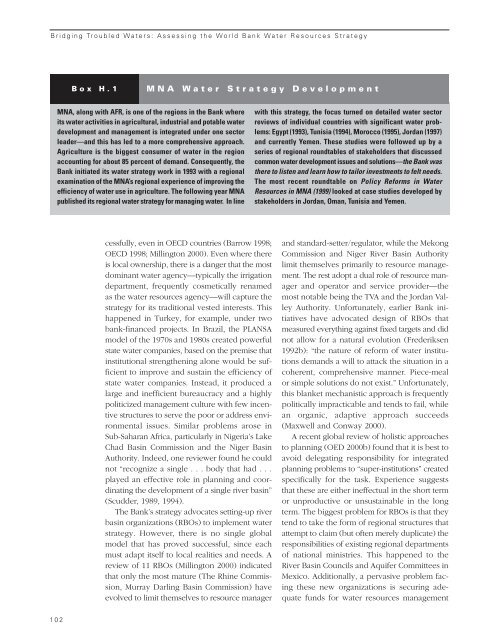Download Report - Independent Evaluation Group - World Bank
Download Report - Independent Evaluation Group - World Bank
Download Report - Independent Evaluation Group - World Bank
Create successful ePaper yourself
Turn your PDF publications into a flip-book with our unique Google optimized e-Paper software.
Bridging Troubled Waters: Assessing the <strong>World</strong> <strong>Bank</strong> Water Resources StrategyBox H.1MNA Water Strategy DevelopmentMNA, along with AFR, is one of the regions in the <strong>Bank</strong> whereits water activities in agricultural, industrial and potable waterdevelopment and management is integrated under one sectorleader—and this has led to a more comprehensive approach.Agriculture is the biggest consumer of water in the regionaccounting for about 85 percent of demand. Consequently, the<strong>Bank</strong> initiated its water strategy work in 1993 with a regionalexamination of the MNA’s regional experience of improving theefficiency of water use in agriculture. The following year MNApublished its regional water strategy for managing water. In linewith this strategy, the focus turned on detailed water sectorreviews of individual countries with significant water problems:Egypt (1993), Tunisia (1994), Morocco (1995), Jordan (1997)and currently Yemen. These studies were followed up by aseries of regional roundtables of stakeholders that discussedcommon water development issues and solutions—the <strong>Bank</strong> wasthere to listen and learn how to tailor investments to felt needs.The most recent roundtable on Policy Reforms in WaterResources in MNA (1999) looked at case studies developed bystakeholders in Jordan, Oman, Tunisia and Yemen.cessfully, even in OECD countries (Barrow 1998;OECD 1998; Millington 2000). Even where thereis local ownership, there is a danger that the mostdominant water agency—typically the irrigationdepartment, frequently cosmetically renamedas the water resources agency—will capture thestrategy for its traditional vested interests. Thishappened in Turkey, for example, under twobank-financed projects. In Brazil, the PLANSAmodel of the 1970s and 1980s created powerfulstate water companies, based on the premise thatinstitutional strengthening alone would be sufficientto improve and sustain the efficiency ofstate water companies. Instead, it produced alarge and inefficient bureaucracy and a highlypoliticized management culture with few incentivestructures to serve the poor or address environmentalissues. Similar problems arose inSub-Saharan Africa, particularly in Nigeria’s LakeChad Basin Commission and the Niger BasinAuthority. Indeed, one reviewer found he couldnot “recognize a single . . . body that had . . .played an effective role in planning and coordinatingthe development of a single river basin”(Scudder, 1989, 1994).The <strong>Bank</strong>’s strategy advocates setting-up riverbasin organizations (RBOs) to implement waterstrategy. However, there is no single globalmodel that has proved successful, since eachmust adapt itself to local realities and needs. Areview of 11 RBOs (Millington 2000) indicatedthat only the most mature (The Rhine Commission,Murray Darling Basin Commission) haveevolved to limit themselves to resource managerand standard-setter/regulator, while the MekongCommission and Niger River Basin Authoritylimit themselves primarily to resource management.The rest adopt a dual role of resource managerand operator and service provider—themost notable being the TVA and the Jordan ValleyAuthority. Unfortunately, earlier <strong>Bank</strong> initiativeshave advocated design of RBOs thatmeasured everything against fixed targets and didnot allow for a natural evolution (Frederiksen1992b): “the nature of reform of water institutionsdemands a will to attack the situation in acoherent, comprehensive manner. Piece-mealor simple solutions do not exist.” Unfortunately,this blanket mechanistic approach is frequentlypolitically impracticable and tends to fail, whilean organic, adaptive approach succeeds(Maxwell and Conway 2000).A recent global review of holistic approachesto planning (OED 2000b) found that it is best toavoid delegating responsibility for integratedplanning problems to “super-institutions” createdspecifically for the task. Experience suggeststhat these are either ineffectual in the short termor unproductive or unsustainable in the longterm. The biggest problem for RBOs is that theytend to take the form of regional structures thatattempt to claim (but often merely duplicate) theresponsibilities of existing regional departmentsof national ministries. This happened to theRiver Basin Councils and Aquifer Committees inMexico. Additionally, a pervasive problem facingthese new organizations is securing adequatefunds for water resources management102
















